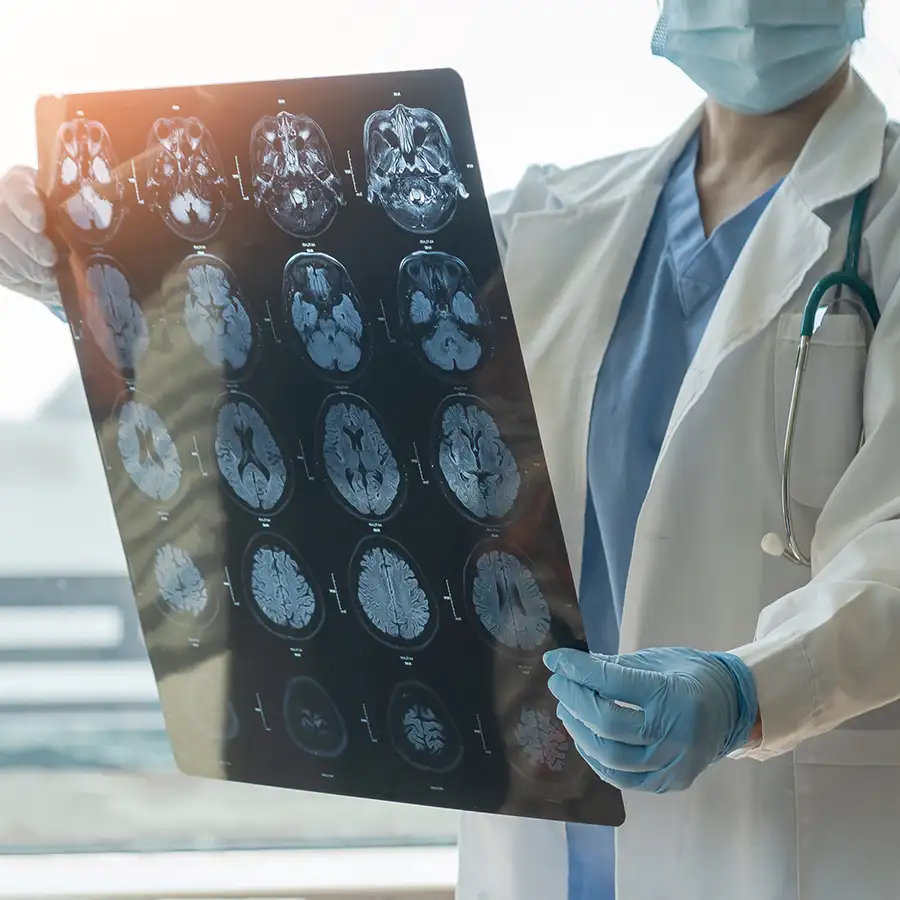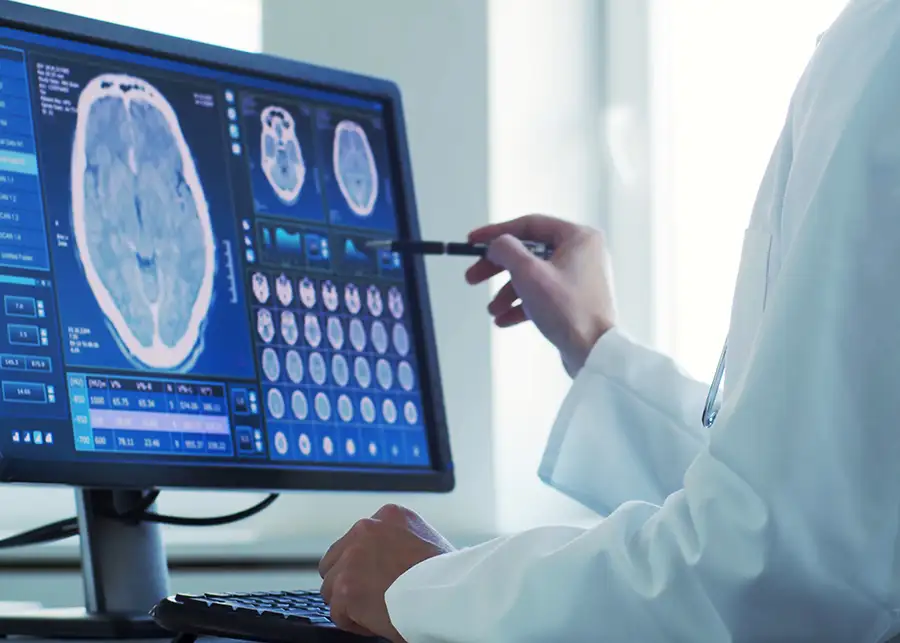Conditions & Disorders
An In-Depth Guide to Neurological Conditions & Disorders
Navigating the intricacies of neurological concerns can often be accompanied by a whirlwind of emotions and uncertainties. At Midwest Neurology Associates, S.C., located in Decatur, IL, we recognize and deeply understand these feelings.
Our approach is rooted in compassion and clarity. We’re aware that every question, every symptom, and every concern you bring to us is significant. Waiting for answers about one’s neurological health can be daunting, and our commitment is to offer not just medical expertise but also a comforting hand during this period. Each evaluation, test, and conversation is focused on providing you with insights and understanding. Our focus goes beyond just medical assessments; it’s about guaranteeing you feel valued, heard, and guided throughout your journey. Trust in our team to be your steadfast ally as you explore and determine the best care pathways.
Innovations and Research in Neurology
The world of neurology is continuously evolving, illuminated by ground-breaking discoveries, forward-thinking innovations, and research that reshapes our understanding of the human nervous system.
At Midwest Neurology Associates, S.C., our commitment extends beyond just observing these milestones. We actively participate in pioneering research, embrace the latest techniques, and integrate modern methodologies into our practice. This proactive approach guarantees that our patients always have access to the most advanced care options available. In this blend of tradition and innovation, our mission remains steadfast: delivering unparalleled neurological care in line with the latest advancements in medical science.
At the heart of our mission at Midwest Neurology Associates, S.C. is an unwavering dedication to harnessing the latest in neurological research and innovation. We are driven by the potential to change lives, offering renewed hope and enhanced well-being to those we serve.

Neurodegenerative Therapies:
The potential of stem cell research and neurodegenerative therapies is vast. These methods, targeting ailments like Parkinson’s disease and multiple sclerosis, aim to either rejuvenate damaged neurons or bolster the health of existing ones, heralding a new era in treatment possibilities.
Digital & Remote Monitoring:
The advent of wearable tech and innovative digital platforms is reshaping patient monitoring. Devices that can log seizures, track movement inconsistencies in Parkinson’s patients, or monitor sleep provide real-time data, paving the way for timely interventions and tailored treatment strategies.
Personalized Medicine:
With our expanding knowledge of genetics and its correlation with neurological disorders, treatment plans are becoming increasingly personalized. By analyzing an individual’s genetic blueprint, we can optimize treatments, enhancing their effectiveness while reducing adverse side effects.
Collaborative Research Initiatives:
Collaboration fuels progress. At Midwest Neurology Associates, S.C., we engage in joint research ventures with leading institutions, universities, and medical centers worldwide. This synergy fast-tracks the translation of discoveries into actionable treatments for our patients.

Neurological Conditions & Disorders
When faced with neurological concerns or diagnoses, it’s natural for patients and their families to have myriad questions. At Midwest Neurology Associates, S.C., we believe that clarity is a cornerstone of effective care, and we’re committed to providing comprehensive answers to the most frequently asked questions surrounding neurological conditions and disorders. Understanding your neurological health can sometimes feel overwhelming. But remember, you’re not alone on this journey.
At Midwest Neurology Associates, S.C., we stand by our commitment to guiding you every step of the way, ensuring that your questions are answered and that you feel empowered in your care decisions.
Neurological Conditions & Disorders FAQs
- Q: What is it?
- A: Alzheimer’s disease is a progressive neurodegenerative disorder that affects memory, thinking, and behavior. Dementias refers to a group of conditions characterized by cognitive impairment.
- Q: What are the symptoms?
- A: Memory loss, difficulty completing familiar tasks, confusion with time or place, and mood changes.
- Q: When should I see a doctor?
- A: See a doctor if you or a loved one has experienced persistent memory problems or other cognitive difficulties.
- Q: What is it?
- A: A progressive neurodegenerative disease affecting nerve cells in the brain and spinal cord.
- Q: What are the symptoms?
- A: Muscle weakness, difficulty speaking, swallowing, and breathing.
- Q: When should I see a doctor?
- A: If you experience consistent muscle weakness or difficulty with speech and breathing.
- Q: What is it?
- A: Physical trauma to the brain or spinal cord or abnormal blood vessels in the brain.
- Q: What are the symptoms?
- A: Vary widely but can include headaches, confusion, paralysis, and loss of consciousness.
- Q: When should I see a doctor?
- A: Immediately after a head or spinal trauma or if experiencing symptoms indicative of vascular malformations.
- Q: What is it?
- A: A cerebral aneurysm is a bulging, weak area in the wall of an artery in the brain. Arteriovenous malformations are tangled blood vessels in the brain.
- Q: What are the symptoms?
- A: Can be asymptomatic but may include headache, vision problems, and seizures.
- Q: When should I see a doctor?
- A: If you experience sudden severe headaches, especially with neurological symptoms.
- Q: What is it?
- A: Cerebral palsy is a group of disorders affecting movement and posture. Spasticity is a symptom of cerebral palsy characterized by tight or stiff muscles.
- Q: What are the symptoms?
- A: Muscle stiffness, involuntary movements, and difficulty with coordination.
- Q: When should I see a doctor?
- A: If you notice developmental delays in an infant or child or persistent muscle stiffness.
- Q: What is it?
- A: A mild traumatic brain injury usually resulting from a blow to the head.
- Q: What are the symptoms?
- A: Headache, confusion, dizziness, and memory problems.
- Q: When should I see a doctor?
- A: After a blow to the head, especially if symptoms persist or worsen.
- Q: What is it?
- A: Inflammation of the brain, often due to an infection.
- Q: What are the symptoms?
- A: Fever, headache, confusion, and seizures.
- Q: When should I see a doctor?
- A: If you have symptoms of encephalitis, especially after a viral illness or mosquito bite.
- Q: What is it?
- A: A central nervous system disorder in which brain activity becomes abnormal, leading to seizures.
- Q: What are the symptoms?
- A: Repeated seizures, blank stares, and involuntary muscle spasms.
- Q: When should I see a doctor?
- A: If you or someone you know experiences a seizure or recurring seizures.
- Q: What is it?
- A: A group of conditions causing pain in or around the face.
- Q: What are the symptoms?
- A: Pain in the face, often sharp or burning.
- Q: When should I see a doctor?
- A: If facial pain persists and impacts daily life.
- Q: What is it?
- A: Headaches are pain in any part of the head, while migraines are severe headaches often accompanied by other symptoms.
- Q: What are the symptoms?
- A: Throbbing pain, sensitivity to light and sound, and nausea.
- Q: When should I see a doctor?
- A: If headaches are recurrent, severe, or accompanied by other symptoms like visual disturbances.
- Q: What is it?
- A: Accumulation of cerebrospinal fluid in the brain, leading to increased pressure inside the skull.
- Q: What are the symptoms?
- A: Headache, vomiting, vision problems, and balance difficulties.
- Q: When should I see a doctor?
- A: If you notice symptoms, especially in infants (like an unusually large head).
- Q: What is it?
- A: Inflammation of the membranes covering the brain and spinal cord.
- Q: What are the symptoms?
- A: Fever, headache, stiff neck, and sensitivity to light.
- Q: When should I see a doctor?
- A: If you experience symptoms, especially if they appear suddenly.
- Q: What is it?
- A: A range of conditions affecting mood, thinking, and behavior.
- Q: What are the symptoms?
- A: Varies widely but can include sadness, anxiety, hallucinations, or behavioral changes.
- Q: When should I see a doctor?
- A: If persistent emotional or behavioral symptoms affect your quality of life.
- Q: What is it?
- A: A chronic autoimmune disease affecting the central nervous system.
- Q: What are the symptoms?
- A: Fatigue, difficulty walking, numbness, and muscle spasms.
- Q: When should I see a doctor?
- A: If you experience neurological symptoms that persist or recur.
- Q: What is it?
- A: Myasthenia gravis is an autoimmune neuromuscular disorder, while myopathies are diseases of the muscle tissue.
- Q: What are the symptoms?
- A: Muscle weakness, fatigue, and difficulty swallowing.
- Q: When should I see a doctor?
- A: If you consistently experience muscle weakness, especially if it worsens with activity
- Q: What is it?
- A: Discomfort or pain originating from the neck, back, or spinal structures.
- Q: What are the symptoms?
- A: Pain, stiffness, and limited range of motion.
- Q: When should I see a doctor?
- A: If pain persists, is severe, or is accompanied by other symptoms like numbness.
- Q: What is it?
- A: A progressive neurodegenerative disorder affecting movement.
- Q: What are the symptoms?
- A: Tremors, slowed movement, and rigidity.
- Q: When should I see a doctor?
- A: If you notice persistent shaking or difficulty with movement.
- Q: What is it?
- A: Damage to the peripheral nerves causing weakness, numbness, and pain.
- Q: What are the symptoms?
- A: Numbness, tingling, and pain, usually in the hands and feet.
- Q: When should I see a doctor?
- A: If you consistently experience the symptoms, especially if they worsen.
- Q: What is it?
- A: Conditions that disrupt normal sleep patterns.
- Q: What are the symptoms?
- A: Insomnia, excessive daytime sleepiness, and abnormal sleep behaviors.
- Q: When should I see a doctor?
- A: If sleep disturbances persist and impact daily life.
- Q: What is it?
- A: A medical emergency where blood flows to the brain is interrupted.
- Q: What are the symptoms?
- A: Sudden weakness or numbness on one side, confusion, and trouble speaking.
- Q: When should I see a doctor?
- A: Immediately if you suspect a stroke.
- Q: What is it?
- A: Tremor is an involuntary shaking movement. Dystonia is a movement disorder causing involuntary muscle contractions.
- Q: What are the symptoms?
- A: Shaking in hands, arms, or legs; abnormal posture or twisting movements.
- Q: When should I see a doctor?
- A: If you consistently experience involuntary movements or posture
- Q: What is it?
- A: Abnormal growths in the brain, spinal column, or peripheral nerves.
- Q: What are the symptoms?
- A: Headaches, seizures, and neurological deficits.
- Q: When should I see a doctor?
- A: If you experience persistent neurological symptoms or changes in cognitive function.

